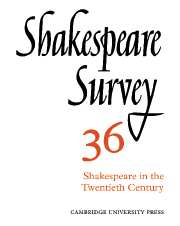Book contents
- Frontmatter
- Shakespeare and the Living Dramatist
- Blood and Wine: Tragic Ritual from Aeschylus to Soyinka
- Hamlet Andante/Hamlet Allegro: Tom Stoppard’s Two Versions
- Auden, Shakespeare, and the Defence of Poetry
- Graves on Lovers, and Shakespeare at a Lovers’ Funeral
- Tragic Balance in Hamlet
- Hamlet Across Space and Time
- Shakespeare’s Scripts and the Modern Director
- ‘He Shall Live a Man Forbid’: Ingmar Bergman’s Macbeth
- Komisarjevsky at Stratford-upon-Avon
- Troilus and Cressida and the Definition of Beauty
- The Pastoral Reckoning in Cymbeline
- New Created Creatures: Ralph Crane and the Stage Directions in The Tempest
- Arden of Faversham
- ‘Pickleherring’ and English Actors in Germany
- Shakespeare Performances in Stratford-upon-Avon and London, 1981–2
- The Year's Contributions to Shakespearian Study 1 Critical Studies
- 2 Shakespeare’s Life, Times and Stage
- 3 Textual Studies
- Index
- Plate Section
3 - Textual Studies
Published online by Cambridge University Press: 28 March 2007
- Frontmatter
- Shakespeare and the Living Dramatist
- Blood and Wine: Tragic Ritual from Aeschylus to Soyinka
- Hamlet Andante/Hamlet Allegro: Tom Stoppard’s Two Versions
- Auden, Shakespeare, and the Defence of Poetry
- Graves on Lovers, and Shakespeare at a Lovers’ Funeral
- Tragic Balance in Hamlet
- Hamlet Across Space and Time
- Shakespeare’s Scripts and the Modern Director
- ‘He Shall Live a Man Forbid’: Ingmar Bergman’s Macbeth
- Komisarjevsky at Stratford-upon-Avon
- Troilus and Cressida and the Definition of Beauty
- The Pastoral Reckoning in Cymbeline
- New Created Creatures: Ralph Crane and the Stage Directions in The Tempest
- Arden of Faversham
- ‘Pickleherring’ and English Actors in Germany
- Shakespeare Performances in Stratford-upon-Avon and London, 1981–2
- The Year's Contributions to Shakespearian Study 1 Critical Studies
- 2 Shakespeare’s Life, Times and Stage
- 3 Textual Studies
- Index
- Plate Section
Summary
Of the eight editions and the many studies to come before this review this year, the crowning achievement is Professor Harold Jenkins’s monumental and magisterial edition of Hamlet for the new Arden Shakespeare. There is every likelihood also that this edition will prove to be the crown of the entire series. The edition is 592 pages in length–by far the largest of the series. The single element that occasions this substance is the section of ‘Longer Notes’. We must be grateful to the publishers for having accepted the proposition that Hamlet could not fully be edited without these Notes–150 pages of detailed and thoughtful analysis of the specific problems in the play. On most of them Jenkins finds ways to surprise with the unexpected simplicity and cogency of his argument. At the other end of the volume the Introduction offers another 159 pages, treasure troves of fresh ideas.
the Longer Notes Jenkins's treatment of Ophelia and of her two 'fathers' - the fishmonger (2.2.171-2) and Jephthah (2.2.398-9). Jenkins explains for the benefit of directors that Polonius's precepts are not funny (1.3); he argues that Horatio and Marcellus swear three times on Hamlet's sword (1.5) - pointing out that three different oaths are proposed to them by Hamlet; he declares that the 'nunnery' (3.1) 'for Ophelia is a sanctuary from... the world's contamination' (p. 496), yet he admits that Hamlet's iteration of the word does not rule out the possibility of ambiguity; he justifies Hamlet's 'more horrid hent' in postponing the death of Claudius (3.3): 'the convention enables revenge to be shown in its most repulsive aspect' (p. 515); and he sees Hamlet's apology to Laertes (5.2) as representing the fact that Hamlet 'wrongs Laertes not by "a purpos'd evil" but "when he's not himself" (p. 567).
- Type
- Chapter
- Information
- Shakespeare Survey , pp. 181 - 196Publisher: Cambridge University PressPrint publication year: 1983



